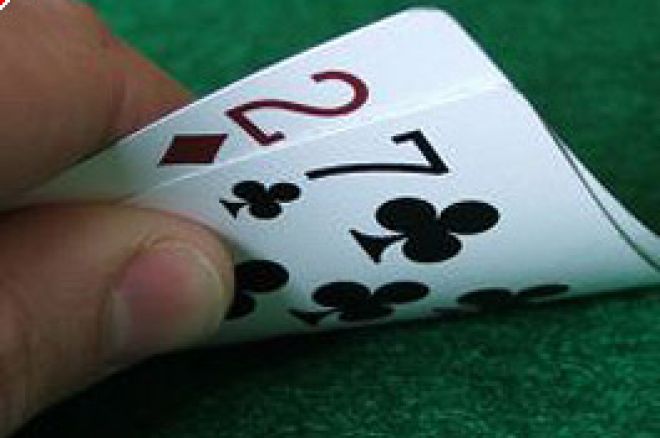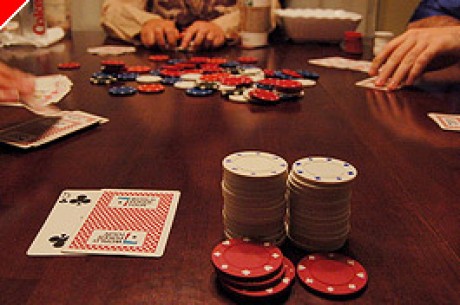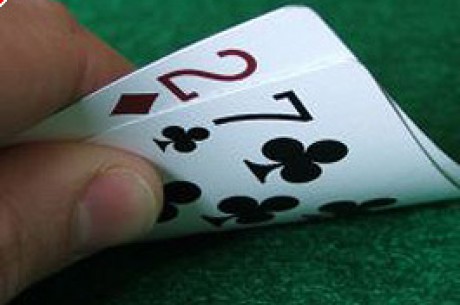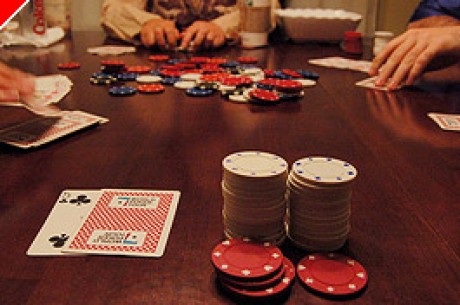The 'Other' Games of Poker: Limit Omaha Hi-Lo

In previous columns, we've presented some of poker's wilder, more action-oriented games as an alternative to hold'em, but what if you're looking for a lower-variance choice to help boost your bankroll? It would be well worth your while to add limit Omaha hi-lo to your poker arsenal. Growing significantly in popularity over the last decade, Omaha hi-lo is spread in all the major online poker rooms including Poker Stars, Full Tilt, and Ultimate Bet. The availability of live Omaha hi-lo cash games is also on the rise. In Southern California, the Commerce Casino and the Bicycle Club can sometimes feature over a dozen different Omaha hi-lo tables running simultaneously while Vegas poker rooms including The Mirage, Bellagio, Wynn, and Red Rock also spread it on a daily basis. The great news about Omaha hi-lo (also frequently referred to as Omaha 8 or better) isn't only the game's low variance. Omaha hi-lo beginners are more often than not far worse players than their Texas hold'em counterparts, and a skilled Omaha player can enjoy a higher earn rate than they might get grinding away at limit hold'em.
Rules
Like hold'em, Omaha hi-lo is a flop game. Players receive four down cards to start and must use two and only two of those cards to combine with three and only three of the community cards to form their best high hand and their best low hand. Half the pot is awarded to the best high hand with the other half going to the best low hand. The "8 or better" aspect in Omaha hi-lo means that a hand qualifies for low only if it is comprised of five cards lower than 8. Thus, there is not always a qualifying low hand at the showdown and in that case, the entire pot goes to the best high hand. A quick way to determine whether or not there will be a low pot is if there are three cards 8 or lower on the board. A board like 2s-5d-Qh-8d-Kh contains a low. A board like 4h-9d-2d-Jh-Th does not.
Omaha hi-lo is played in a two-tiered limit structure, exactly like hold'em. There is a button, a small blind, a big blind and betting rounds before the flop, on the flop, on the turn, and on the river. In a $10-$20 limit game, bets before the flop and on the flop are $10, and on the turn and river they double to $20. Players can also use different combinations of two of their hole cards and three from the board to create their high and low hands. Holding the Ah-2d-3d-Qh on a 4h-7d-Jh-Kh-2s board, I would use the Ah-3d to combine with the 4h-7d-2s for the low hand and the Ah-Qh with the 4h-Jh-Kh to make the nut flush for high.
Basic Strategy/Starting Hands
Omaha hi-lo is a game of the nuts. With four cards in each player's hand, the sheer number of two-card combinations available tell us that the nuts are probably out there. Hand values increase dramatically in Omaha. While the median winning hand in hold'em is two pair, that hand is more often than not worthless in Omaha. If you're drawing to a flush, make it the nut flush. If you're drawing to a straight, make it the nut straight and if you're drawing to a low, you really need to make sure it's the nut low. Drawing to ten-high flushes, second nut lows and the bad ends of straights are huge money losers.
The #1 thing a beginner needs to understand about limit Omaha hi-lo? Play to scoop. The object of the game is to win the whole pot, not just half of it. Far too many novices chase down low hands and then wonder why they're losing money. When deciding whether or not to play a starting hand, examine its scoop potential. First off, does my hand have an ace? If you're a beginning player and the answer is no, you should probably throw it away and wait for a better opportunity. Aces are a vital component of strong Omaha hi-lo hands. They are needed to make the best low, the highest pair, the highest straight, and the highest flush. Next, what are my high possibilities? A hand like Ad-2s-Kd-Qd could lead to a number of powerful high hands. The suited ace could make the nut flush, and the suited king and queen have high straight and flush possibilities. Finally, take a look at your low possibilities. The A-2-K-Q hand also contains potential to make the nut low, with the presence of the all-important A-2. Many, but not all premium O8 starting hands contain an A-2 or A-3 for their strong low potential. The granddaddy of them all is A-A-2-3 double-suited, the most powerful starting hand in Omaha hi-lo.
Starting hands in Omaha hi-lo are so important because your decision whether or not to enter the pot in the first place is the most important one you'll make in the course of a hand. A-A-2-X, A-2-3-X, A-A-3-X, A-3-4-5, A-2-3-K, and A-K-Q-2 are all great starting hands that have multiple possibilities to develop into the nuts. Suited aces with one or two accompanying low cards (As-2s-4d-Qd) are also very playable, especially in multi-way pots. If there is anything to avoid playing before the flop, it's middle cards. A hand like 5-6-8-9 or 3-4-8-J is absolute garbage in Omaha hi-lo. The only hands these cards can develop into are middle straights, middle flushes, terrible lows and two pair– bankroll-draining propositions all.
Remember how I mentioned the low variance of Omaha hi-lo? Another great thing about this game is that it's one of the best game choices for a player on a short bankroll. While conventional poker wisdom states that an average limit hold'em player would need at least 300-400x the big blind for a sufficient bankroll, an average Omaha 8 player can play on a bankroll about 1/3 to ½ that size. To play in an online $3-$6 hold'em game, a player might want a bankroll of $1,800-$2,400 to protect themselves from variance. For a $3-$6 Omaha 8 game, a similarly skilled player could survive in the game with only a $600-$1,200 roll. Split pots keep the variance down and the occasional huge scoop keep profits up.
Adding Omaha hi-lo to your repertoire is guaranteed to spice up your poker experience. If you've wondered where all the bad players on the internet have gone, some of them are still playing hold'em, but even more are giving Omaha 8 a shot. Just play tight, exercise a little patience, and you'll be well on your way.








